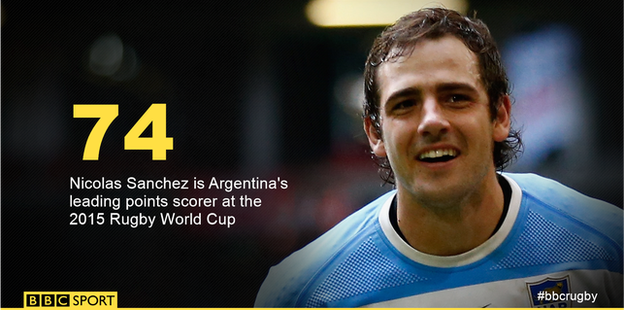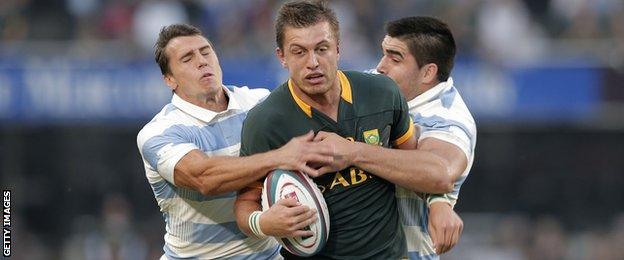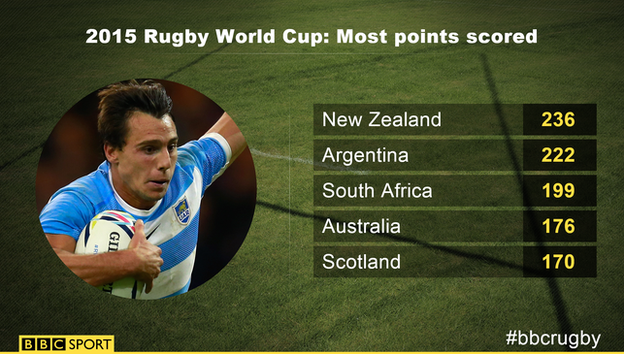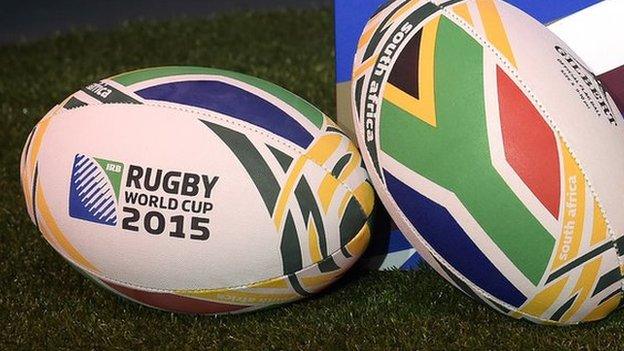Rugby World Cup 2015: Latin flair the key to Argentina success
- Published

Juan Martin Fernandez Lobbe can look forward to his second World Cup semi-final
Rugby World Cup, 18 September-31 October |
|---|
Coverage: Live on BBC Radio 5 live or 5 live sports extra, plus live text commentary on the BBC Sport website. |
Further coverage: BBC Radio Wales, BBC Radio Cymru, BBC Radio Scotland and BBC Radio Ulster. |
Stuart Lancaster take note - that was culture. Ambition, elan, ruthlessness and joy combined. Not borne of headmasterly principles, but unlocked from the heart. Lancaster had four years, Argentina created a new culture in three - and, as they demonstrated against Ireland in Cardiff, their one works.
It is often said that rugby union is a complicated game, but rarely down in New Zealand. When Agustin Pichot, former Pumas scrum-half and principal architect of Argentina's rise, asked Sir Graham Henry how his country might become more successful in 2012, the All Blacks' World Cup-winning coach replied: "You have to score more tries." To Henry, it really was that simple.
And so, first under Santiago Phelan and then under his successor Daniel Hourcade, Argentina ripped up a philosophy and started again. Out went dour, 10-man rugby, in came a 15-man game that tapped into the Latin temperament.
"This rugby that we are trying to play, that's since we entered the Rugby Championship," says Pumas scrum-half Martin Landajo, whose side have been playing in the southern hemisphere Rugby Championship since 2012.
More from the Rugby World Cup: |
|---|
For the latest rugby union news, follow @bbcrugbyunion, external on Twitter |
"Football in Argentina is like that. But four years ago, Argentina didn't play rugby like that. So we changed it. Us Argentinians, we're Latins, we like to be happy all the time, it's in our roots, and hopefully that shows in our rugby now."
Happy is as happy does and against Argentina, Ireland were steamrollered by exuberance. And it was wonderful to watch. Making a mockery of the old adage "you have to earn the right to go wide", Argentina looked for width at every opportunity, fizzing the ball from the breakdown at pace, keeping the ball alive and demonstrating finishing so clinical it belonged in an operating theatre.
Argentina's pack, every bit as imposing as in the ugly old days, provided the foundations but it was fly-half Nicolas Sanchez, playing right up on the gain-line and thus creating precious space outside him, who was the chief architect.

The early tries by Matias Moroni and the prolific Juan Imhoff took the breath away, but it was Joaquin Tuculet's decisive strike with 12 minutes remaining that highlighted the difference between rugby in the two hemispheres.
Despite being wrapped up in a ball of green, full-back Tuculet somehow managed to stretch an arm out and touch down in the corner. Delivering skills under intense pressure, that's what success in any elite sport comes down to.
Argentina are proof that the only way you can improve at anything is by testing yourself against superior opposition. And the same applies whether you're playing pool or darts down the pub or rugby union at international level.

Argentina beat South Africa 37-25 in the Rugby Championship in August
It took until 2014 for Argentina to record their first win in the Rugby Championship, against Australia in Mendoza, but they followed that up with a first ever victory over South Africa in Durban this year.
Buoyed, the Pumas gave defending champions New Zealand a real scare in their World Cup opener, were the highest scorers in the pool stages and topped the lists for offloads, metres gained, clean breaks and defenders beaten.
Had Argentina not been flatly rejected by the Six Nations in 2007, things might have been very different. Like France, Argentina might have been lumbering and conservative; like Wales, they might have been too one-dimensional; like England, they might have still been trying to discover who and what they are.
Instead, Argentina learned from the best teams in the world that success in international rugby stems from having an all-round game, from executing skills at pace and seeking space rather than confrontation.

Of the four 2015 World Cup semi-finalists, only New Zealand have scored more points than Argentina
Argentina will only get more consistent. From 2016, they will have a franchise in Super Rugby, meaning that no longer will their best players be scattered to the winds and controlled by European clubs. Instead, they will be mixing it with the best in a club competition some northern hemisphere fans dismiss as "powder-puff" rugby.
On the evidence of this World Cup, the players it produces are tough enough. Ask anyone who's been run over by Julian Savea.
Spare a thought for the Irish. There must have been 50,000 crammed into the Millennium Stadium, cheering ear-splittingly for a side racked by suspensions and injury. It was difficult to remember a noise like it. But all the noise in the world won't make your team think clearer when the chips are down.
"Their combination of power and pace made it very difficult," said forlorn Ireland head coach Joe Schmidt. "And they certainly have some players with great footwork."
Added flanker Chris Henry: "It felt like every time you got the ball, you got the chop. I don't think we've played against a team that gets off the line and chops so hard."
There you have it, from those who have had this this new Argentine recipe rammed down their throats: the Pumas are a team of power and pace who chop as hard as anyone in the world. And like all the best recipes, it comes from the heart.
- Published18 October 2015

- Published18 October 2015

- Published12 October 2015

- Published18 September 2015

- Published3 February 2017

- Published14 September 2016

- Published15 February 2019

- Published25 September 2015

- Published8 September 2015
